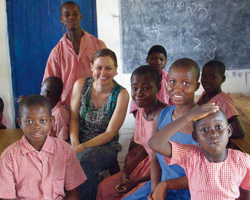27 May 2010

Teacher Katie Robinson has recently returned from a two year volunteer placement in Ghana, West Africa, where she worked towards improving the education of children with special needs. Here she shares with us professional and personal challenges and the major life changes the experience of volunteering with Volunteer Service Overseas (VSO) has brought about.
Volunteering in Ghana
I have recently returned from a 2-year VSO placement in Ghana, West Africa, working towards improving the education of children with special needs. I was situated in Bolgatanga, which is a town of about fifty thousand people, and is the capital of the Upper East Region - one of the poorest regions of Ghana. Bolga, as the locals call it, is about a 17-hour bus ride from the capital and the coast, up near the Burkina Faso border. My job title was "Special Education Support Officer", and I shared an office at the Regional Ghana Education Service, working in a two-person team with Mr Musah Sulemanna, the Special Education Officer for the region.
My job in Ghana is the best that I've ever had. I loved my work - it was rewarding, enjoyable, fulfilling and challenging, yet, I couldn't say that it was ever easy. I faced many challenges along the way.
When I arrived, the Regional Special Education 'department' consisted of Sule, myself, one table and one chair - we didn't have funding for paper, let alone petrol to actually travel to all of the districts in the region we were responsible for. My first few months were spent writing funding proposals to local and international NGOs and government organisations, and applying to our Director for the use of vehicles and resources.
A huge part of my job involved teacher training, and a big challenge there was the lack of motivation of the teachers - many of them were untrained, poorly paid (needing to supplement their income through farming), teaching huge classes (some of over 80 students), in poorly resourced schools without electricity. There had been a flood the year before I arrived, which devastated crops meaning that many children were going hungry.
Add to this the problems specific to the area of Special Needs Education - for example the fairly common belief that disability is the result of witchcraft, the woman's infidelity or the family's curse and that many children with disabilities are hidden at home and not allowed to come to school at all, and you have a very difficult situation.
Despite these challenges, Sule and I achieved a lot during my time in Ghana. One big achievement happened when we applied for, and received funding to run two-day workshops for between 35-55 participants in each of the eight districts in our region.
The training workshops were targeted at school principals, school supervisors, District Special Education Officers and key teachers, with the expectation that each participant would pass the knowledge and understandings gained onto the teachers they work with.
Through the workshops, myself and the other facilitators, worked to shatter the myths around the cause of disability, encourage inclusive education strategies - such as the use of teaching and learning materials - and provide information about the legal rights and responsibilities of people with disabilities. Sule and I also ran regular in-school teacher training, community education through participation in Parent/Teacher Association meetings, and support of the local School for the Deaf, and the schools for children with severe intellectual disabilities.
Working in Special Education in northern Ghana is very different to working in Australia. Many of the reference books that I would have used at home were useless because the teaching strategies revolved around technology and expensive equipment. Many of the children I worked with couldn't afford glasses or hearing aides, let alone computers to help them with their education. In fact many of the disabilities that I saw were caused or exacerbated by poverty, for example through poor nutrition or insufficient medical care. Resources of any kind were difficult to access, and it required a lot of flexibility and ingenuity to find ways of working without them.
Working in Ghana has benefited me in many ways, both professionally and personally. It allowed me to work at a much higher level, and in a much more varied capacity than in Australia. It has given me a new perspective of the world, and a deep appreciation of life. I've gained confidence, skills and lasting friendships. I've learned the importance of patience, and that small changes can make a big difference. |

